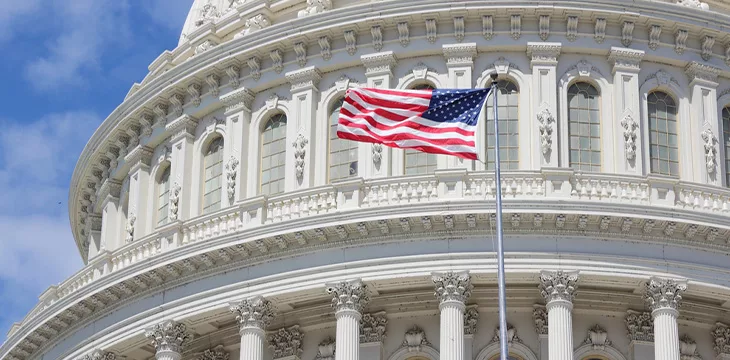|
Getting your Trinity Audio player ready...
|
The House Committee on Energy and Commerce unanimously passed a blockchain bill on Tuesday that would task the Secretary of Commerce with promoting the competitiveness of the U.S. in relation to “the deployment, use, application, and competitiveness of blockchain technology or other distributed ledger technology.”
In a December 5 session, the Committee unanimously passed the draft bill, 46 votes to 0, and it will now head to a full House vote.
Titled “Deploying American Blockchains Act of 2023,” the bill was warmly received by some industry figures. Cody Carbone, Vice President of Policy for blockchain advocacy group the Chamber of Digital Commerce, wrote on X (formerly Twitter), “this bipartisan bill will help preserve U.S. leadership in blockchain development, which is sorely needed.” While CEO of the Blockchain Association, Kristin Smith, said that the bill “rightfully advances our nation’s competitiveness in this nascent space.”
The 13-page bill directs Secretary of Commerce Gina Raimondo to take a range of actions to progress blockchain technology in the U.S., including establishing best practices to assist the public and private sectors in the deployment of the technology, developing policies and recommendations on related issues and risks, establishing a Blockchain Deployment Program to support American leadership in the space, and examining how federal agencies can benefit from utilizing blockchain technology.
The bill will now join several other digital asset-related legislation heading for a full House vote.
Tabled digital asset bills
In the wake of the various collapses and scandals in the digital asset space in 2022 and 2023 and the resulting crackdown on the sector by regulators such as the Securities and Exchange Committee (SEC), Congress has been actively trying to progress regulation.
In July, the U.S. House Financial Services Committee passed a number of digital asset-related bills aimed at “providing robust consumer protections and legislative clarity for the digital asset ecosystem.”
The key pieces of legislation were the Financial Innovation and Technology (FIT) for the 21st Century Act, the Blockchain Regulatory Certainty Act, the Financial Technology Protection Act of 2023, and the Clarity for Payment Stablecoins Act of 2023.
The FIT for the 21st Century Act passed in a 35-15 vote and is perhaps the most significant of the bills for the industry. It aims to give digital assets regulatory certainty and eliminate some of the grey areas in oversight that, according to some, have caused frustration for regulators and industry alike. Effectively, the FIT for the 21st Century Act widens the jurisdictional authority of the Commodity Futures Trading Commission (CFTC) over the digital asset space and narrows that of the SEC, which has been under fire for its regulation by enforcement approach.
The Blockchain Regulatory Certainty Act, championed by Congress’ “crypto-king” Rep. Tom Emmer (R-MN), is aimed at ensuring that blockchain developers and providers of blockchain services that do not take control of consumer funds are not deemed financial institutions or money service businesses under the law—meaning they would avoid falling within the scope of financial sector regulators, such as the CFTC and SEC.
“The United States’ leadership in the global economy is propelled by our ability to leverage innovations that make markets and communication more efficient,” said Emmer. “America remains a technological leader, not because we force innovations to adopt our values under regulatory duress, but because we allow technology that holds these values at their core to flourish.”
The “Financial Technology Protection Act of 2023,” offered by Rep. Zach Nunn (R-Iowa), would establish the Independent Financial Technology Working Group to Combat Terrorism and Illicit Financing under the Department of Treasury. In addition, it would encourage public-private sector partnerships in tackling issues surrounding illicit finance in the digital asset ecosystem.
Finally, the Clarity for Payment Stablecoins Act of 2023 was authored by House Financial Services Committee Chair Rep. Patrick McHenry (R-NC) and, if enacted, would create a regulatory framework for the issuance and oversight of payment stablecoins. Principal goals would include defining stablecoins and establishing a clear regulatory framework for their issuance and operation; mandating stablecoin issuers to obtain licenses from state regulators and ensure compliance with their relevant rules; and enforcing robust AML and KYC procedures for issuers.
If passed in a full House vote, the digital asset bills, including the Deploying American Blockchains Act of 2023, will need to pass a Senate vote before returning for final congressional and presidential approval.
Watch London Blockchain Conference Day 3 Highlights: Driving innovation, competitiveness with blockchain

 02-27-2026
02-27-2026 




